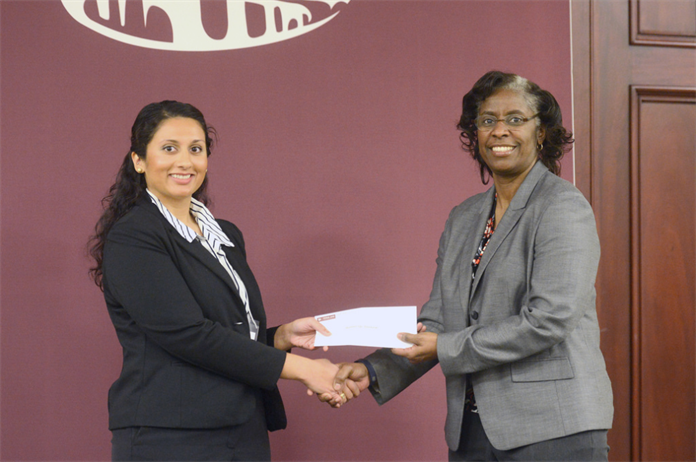Editor's note: Original story posted on Texas A&M Today.
Drawing an analogy between antibiotic-resistant bacteria and the demolition of Kyle Field was apparently clever enough for Texas A&M University doctoral candidate Anthony Sperber to walk away with several titles, including overall winner, at this year’s Three-Minute Thesis (3MT®) competition.
Developed by The University of Queensland in Australia, the 3MT® is a research communication competition open to master’s and Ph.D. students. The competition focuses on excellence in communication, challenging graduate students to translate key research results and their significance to lay audiences in three minutes or less.
The students were judged by a panel of experts from across campus, as well as the audience, who selected People’s Choice winners via texting.
Sperber, a student in the Department of Biochemistry & Biophysics, presented “Identification and Characterization of Proteins Affecting Cell Wall Synthesis,” which summarized research in fighting antibiotic resistance, likening the targeting of bacterial cells to building construction. “We used to fire the construction workers,” Sperber said in making his analogy. “Now we can target the engineers.”
In the end, Sperber was declared the winner and People’s Choice winner in the doctoral category, and the competition’s overall winner, who will move on to regional competition in the coming weeks.

The doctoral runner-up was Sayyeda Marziya Hasan, Department of Biomedical Engineering, with “Self-Expanding Foams for Brain Aneurysm Treatment,” an endeavor to treat potentially fatal brain aneurysms by filling them with polymer foams.
In the Master’s category, the winner and People’s Choice winner was Michael Young, Department of Aerospace Engineering, with “Robotic Rehabilitation and Diagnostic Device for Trismus Patients.” Young emoted the horrors of trismus, a condition which causes extreme pain and difficulty opening one’s mouth, often seen in oral cancer survivors. Young described a hands-free headphone device with motors and sensors that provide therapy by manipulating facial muscles and which also take diagnostics.
The Master’s category runner-up was Kaytan Kelkar, Department of Geology & Geophysics, with “Geodetectives: Connecting the Dots to Map Landslides.” He explained the widespread and devastating dangers of landslides, proposing the use of the Geographic Information System (GIS) to map areas of the world based on their risk for landslides.
Also in the Master’s category was Kelly McNamara, Department of Sociology, who explored the repeated failure of legislators to pass laws protecting the employment rights of transgender individuals in “Failing to Protect: A Historical Analysis of the Employment Non-Discrimination Act.”
The other doctoral competitors were Matthey Josefy, Department of Management, with “To Conform or Not To Conform: Board Responses to the Financial Crisis of 2007-2009;” Maria Reimi, Department of Geology & Geophysics, with “Climate Forensics: How to Use Dust to Reconstruct Ancient Climate;” and Jacqueline Turner, Department of Educational Psychology, with “The Other Side of the Cover: Factors that Influenced the Academic Success of Graduate Students Raised in Poverty.”
Competitors were judged by their communication style, audience comprehension and audience engagement.
Winners were awarded cash prizes.
-30-
Contact: Lesley Henton, lshenton@tamu.edu, 979-845-5591